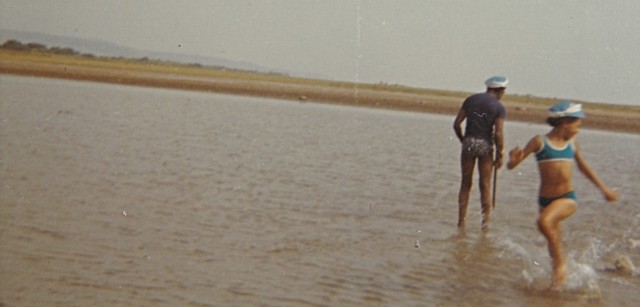Inspired by a “nostalgia” for old family photo albums and described by its creators as a “small tribute to all the Spanish republicans who passed through the concentration camps”, Enric Ribes’ engrossing documentary 5124.GREYKEY uses retro techniques, recreated home movies and personal/archival photography to visualise a daughter’s memories of an enigmatic father. Parents are often mysterious creatures for their children, but for Muriel a series of small discoveries lead her to understand the troubled past of her father José Carlos and to finally understand why he always wore a shirt and trousers to the beach.
Opening with a shot of the sea, the location of the beach and that aforementioned question, revolving around her father’s seemingly inappropriate attire, become central to not only our perception of José Carlos – the man, but Muriel’s appreciation of José Carlos – the father. Much like how the daughter builds a solid understanding of her Dad’s past, bit-by-bit, a picture of Jose only starts to form after we are given the pieces of the puzzle to put together ourselves.
“Very little is known about José Carlos”
From his beachwear, to his strange routines and his fears, like a mystery that is solved little-by-little, as we form a complete picture of this deportee, only then can we truly begin to understand what his life must have been like. “Very little is known about José Carlos”, Ribes explains as we discuss 5124.GREYKEY, “he wanted to erase his past and was very reserved”. Following his deportation, there was scant information to be found about him, but for years he Carlos been of interest to historians, due to two photos from his imprisonment in the Mauthausen concentration camp.
With the material and new information used in this piece having never been seen before 5124.GREYKEY becomes more than just an insightful and compelling short film, it becomes an important historical document. “Many historians are interested”, Ribes reveals as we talk about the decision to capture José Carlos’ story on film and the significance of the short now. With so little information about the concentration camp survivor available before, the director reveals those interested in his story are turning to their documentary for a greater understanding of his past.

Family photos play an important role in creating the nostalgic, intimate feel of the film.
Consisting of painstakingly recreated home movies (reshot on Super 8 and 16mm – as Muriel couldn’t retrieve them), photos (both from Muriel’s archive and historic archives) and stop-motion (created by S/W alums I+G Stop Motion), Ribes and his team are keen to point out that 5124.GREYKEY is a “very handmade movie”. This filmmaking approach not only working to highlight the key element of nostalgia in the short, but also adding a real sense of intimacy to proceedings.
With the director pointing to family photo albums as a key influence in the creation of the film, it’s easy to see how this notion of a personal collection of memories proved inspirational in the filmmaking of 5124.GREYKEY. The confidential feel of the voiceover married with the selection of private photographs from the past (all of which were filmed in 16mm one-by-one) makes it feel as if you’re sitting side-by-side with Muriel as she plucks memories of her father from her mental stores – the clever b-roll footage feeling like echoes of these memories glimpsed straight from her mind.
A visually striking documentary, with a strong emotional hook, Ribes and his fellow Häns production filmmakers return to S/W after impressing back in 2016 with Xiong Di – another film we praised for ‘an engaging storyline with some impressive production values’. 5124.GREYKEY is an exclusive online version of a series of documentaries Ribes and his team created about Spanish prisoners in concentration camps, we’re so glad they decided to share it with S/W and proud to feature this incredible story on our site.

 Rob Munday
Rob Munday